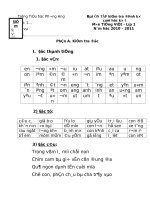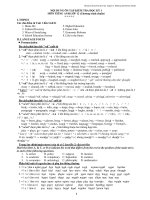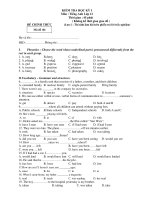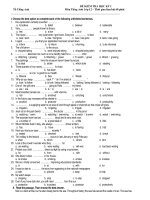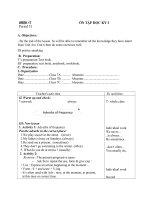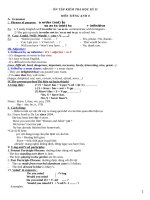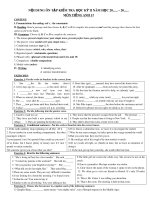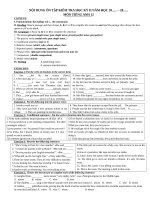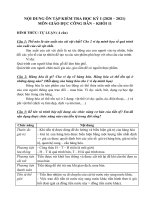NỘI DUNG ÔN TẬP KIỂM TRA HỌC KỲ 1 MÔN TIẾNG ANH LỚP 12 ppt
Bạn đang xem bản rút gọn của tài liệu. Xem và tải ngay bản đầy đủ của tài liệu tại đây (286.22 KB, 9 trang )
Revision for End of First term Test - English 12 - Written by NGUYEN DUC NHUAN
1
NỘI DUNG ÔN TẬP KIỂM TRA HỌC KỲ 1
MÔN TIẾNG ANH LỚP 12 (Chương trình chuẩn)
* * * * *
I. TOPICS
Các chủ điểm từ Unit 1 đến Unit 8:
1. Home life 5. Higher Education
2. Cultural Diversity 6. Future Jobs
3. Ways of Socializing 7. Economic Reforms
4. School Education System 8. Life in the future
II. LANGUAGE FOCUS
Pronunciation
Ba cách phát âm chữ "-ed" cuối từ
1. “-ed” được phát âm là / -id / khi đứng sau âm / t / và / d /
start → started, invite → invited; end → ended, decide → decided
2. “-ed” được phát âm là / -t / khi đứng sau các âm
/ t¯ / (ch) watch → watched, march → marched, reach → reached, approach → approached
/ s / (x, s, ss, se, ce) fix → fixed, pass → passed, miss → missed, sense → sensed,
face
→ faced, dan
ce
→ danced,
force
→
forced, reduce
→
reduced
/ ¯ / (sh) wash
→ washed, fini
sh
→ finished,
brush
→ brushed,
publish
→ published
/ k / (k) work → worked, talk → talked, cook → cooked, panic → panicked
/ p / (p) help → helped, stop → stopped, hope → hoped, escape → escaped
/ f / (f, gh) laugh
→ laughed, cou
gh
→ coughed
(Lưu ý: “-gh” cuối từ thường câm như: plough)
3. “-ed” được phát âm là / -d / khi không thuộc hai trường hợp trên.
clean
→ cleaned, rob → robbed, move → moved, study → studied, breathe → breathed,
* Lưu ý: “-se” cuối từ thường được phát âm là / -z / nên -ed được phát âm là / -d / (không phải là /
-t /):
raise → raised /-zd/, refuse → refused /-zd/, cause → caused, advise → advised, advertise → advertised
Ba cách phát âm chữ “-s / -es” cuối từ
1. “-s/-es” được phát âm là / -s / khi đứng sau âm / k /, / p /, / t /, / f /, / ³ /
book → books, talk → talks, map → maps, drop → drops, hope → hopes, cat → cats, hate→ hates,
paragraph
→ paragraphs, cou
gh
→ coughs, lau
gh
→ laughs, mon
th / ³ /
→ months, six
th
→ sixths
2. “-s/-es” được phát âm là / -iz / khi đứng sau âm / s / (s, ss, se, ce, x), /¯/ (sh), /t¯/ (ch),
/d°/ (ge), /z/
bus
→ buses, gla
ss
→ glasses, hor
se
→ horses, pla
ce
→ places, bo
x
→ boxes, fini
sh
→ finishes
,
teach
→ teaches, cat
ch
→ ca
tches, watch
→ watches,
language
→ languages, Geor
ge
→ George's
3. “-s/-es” được phát âm là / -z / khi không thuộc hai trường hợp trên.
play
→ plays, go → goes, video → videos, potato → potatoes, city → cities, year → years
* Lưu ý: “-th” cuối từ được phát âm là / º / hoặc / ³ /, nếu thêm -s vào thì /³/ thường chuyển sang /-ºz/
Ví dụ: month/³/
→ mon
ths/³s/, path/³/
→ pa
ths/³s/; nhưng mouth/³/
→ mou
ths/ºz/, sheath/³/
→
sheaths/ºz/
Trọng âm chính(main stress) của từ có 2 âm tiết (2 vần) trở lên
Mark the letter A, B, C, or D to indicate the word that differs from the rest in the position of the main stress
in each of the following questions.
1. A. attract B. police C. suppose D. instance
2. A. academic B. compulsory C. September D. statistics
3. A. economics B. archeology C. philosophy D. mathematics
Phân biệt một số nguyên âm và phụ âm thông thường
1. / u / (âm u ngắn) good foot book look cook stood wool woman could sugar butcher
/ u: / (âm u dài) food fool stool cool lose move who blue salute blew grew through
2. / ²u / (âm ơ+u) host home phone worse old open motor slow know mow goal coach
/ au / (âm a+u) house found shout out mouth mount cow allow now how sow
3. / ei / (âm e+i) main name nation nature may plane play day translate they weight waiter
/ ± / (âm a+e) man angry national natural plan translate handbag matter
/ e / (âm e) any many heavy bread head weather friend lemon bury
Revision for End of First term Test - English 12 - Written by NGUYEN DUC NHUAN
2
4. / º / (hữu thanh) the this than these they their though other without with breathe
/ ³ / (vô thanh) thank think thirty theme theory thought tooth birth earth month fourth
5. “ch” → /k/ : ache, chemist, Christmas, architect, technology, psychology, mechanic, headache,
“ch”
→
/t¯/ : church, change, check, chair, cheap, child, achieve, architect, catch,
Vocabulary: Từ vựng liên quan đến các chủ điểm Unit 1 - 8
Exercise: Underline the correct word or phrase to complete each sentence
1. Sorry, I can’t go with you tonight because I have to work on a night ………. (time / shift / period / dawn)
2. They are discussing the ………to establish a new national park. (design / formation / aim / project)
3. My parents always ………. hands to give us a happy family. (connect / link / join / combine)
4. Mary is unselfish girl because she is ………to help others without thinking of any benefit.
(ready / delighted / willing / unwilling)
5. All the members in my class are very ……… of one another. (support / supportive / supporting /supported
)
6. My younger brother is as ……… as a monkey. (mischief / mischievous / mischievously / mischievously)
7. There are three theories to the wild ……… of the dog. (ancestor / founder / commander / discoverer)
8. She ….…… to my letter with a phone call. (offers / responds / answers / reminds)
9. The conical hat is one of the ……… of the Vietnamese culture. (signs / marks / labels / symbols)
10. The groom and the bride ……… their wedding rings in front of the altar. (change / exchange / turn / take)
11. It’s normal to have friendly conversations … … people that they have just met. (to / towards / with / upon)
12. Most of … … celebrate birthdays and give presents at birthday parties.
(Americans / the America / American / the Americans )
13. You should … … your hand when you want to give your opinion.(rise / increase / decrease / raise)
14. A . ……… is a detailed plan for a course of study offered in a school, college.
(programme / plan / curriculum / curricula )
15. Our company has ………… all over the world. (agencies / headquarters / twigs / sprigs)
16. You shouldn’t tell the interviewer about your …… (short-odds / short-waves / shortcomings / shortages)
17. The work- ………of our company are always dependable. (gang / troop / band / force)
18. Our government has tried to raise the … standards of the people in recent years. (life/ lives / living / lived)
19. Developing heavy industry is based on developing … and light industry.
(agriculture / economy / technology / ecology)
20. We are very happy because the reform has brought about ……… effects in education and health care.
(affirmative / negative / positive / possible)
Grammar
1. Tenses of verbs: Simple present, Present progressive, Past simple, Past progressive, Present perfect,
Past perfect, Simple future
2. Forms of verbs:
Bare infinitive
(base form)
To-infinitive
(to + base form)
Present participle
(V-ing )
Past participle
(V-ed / V3)
Gerund
(V-ing)
Gerund perfect
(having + p.p.)
do
be done (passive)
to do
to be done (passive)
doing done doing
being done (passive)
having done
having been done
paint
be painted (passive)
to paint
to be painted (passive)
painting painted painting
being painted (passive)
having painted
having been painted
3. Passive voice: (be + past participle)
Active: S + V + O
Passive: S + be + p.p + (by O)
Chuyển tân ngữ (O) của câu chủ động ra làm chủ ngữ (S) của câu
bị động. Thêm và chia động từ to be cùng thì với thì của động từ
trong câu chủ động. Đổi động từ câu chủ động sang past participle
Exercise 1: Change the following active sentences into the passive.
a. They sell jeans all over the world. →
b. They sold their house last week. →
c. They haven’t cleaned the room yet.
→
d. They will build a new school in our village. →
e. They did this exercise in 30 minutes. →
f. We can do this exercise in 30 minutes. →
g. You must do this exercise carefully. →
h. We have to do this exercise carefully. →
Revision for End of First term Test - English 12 - Written by NGUYEN DUC NHUAN
3
i. They grow rice in tropical countries. →
j. Someone gave Mary this present yesterday. →
k. You should invite Lan to the party. →
l. They say that Bill works very hard. → a) It is
b) Bill is
m. Teachers often make students do a lot of homework.
→
Exercise 2: Underline the correct verb form to complete each sentence
1. Almost everyone …… for home by the time we arrived. ( leave / left / has left / had left )
2. Last night Tina …. in bed when suddenly she heard a scream. ( read / was reading / has read / had read )
3. By the age of 25, he ……… two famous novels. ( wrote / writes / had written / has written )
4. ………. spaghetti every day when you ……. in Italy?
( Were you eating - lived / Did you eat - lived / Did you eat -were living / Do you eat / are living )
5. In some rural areas, health care ……… by a small number of doctors and nurses.
( is providing / is being provided / provides / provided )
6. The report ……… soon. ( publishes / is published / will be published / will publish )
7. How often ……… your car serviced since you bought it ?
( do you get / did you get / had you gotten / have you gotten )
8. According to linguists, there are about 6,000 languages ……. in the world.
( speaking / to speak / which speak / spoken )
9. Please wait here until the manager ( returns / will return / returned / is returning )
10. George ……. back until six. Can you take a message? ( won’t be / isn’t / doesn’t be / wasn’t )
11. Up to the present, George good work in his class. ( has done / have done / does / is doing )
12. The children to stay up late. ( don't allowed / aren't let / aren't allowed / would rather )
4. Reported speech
* Changes in verb tenses (Những thay đổi về thì của động từ)
Verb tenses/forms in directed speech Verb tenses/forms in reported speech
1. Present simple
“I work for a post office,” she said.
Past simple
She said (that) she worked for a post office.
2. Present continuous
“I am feeling ill,” Tom said to me.
Past continuous
Tom told me (that) he was feeling ill.
3. Present perfect
Tony said, “I haven’t done it.”
Past perfect
Tony said (that) he hadn’t done it.
4. Past simple
“I didn’t do it,” said Tony.
Past perfect
Tony said (that) he hadn’t done it.
5. Past continuous
“I was watching TV at the time,” he said.
Past perfect continuous
He said (that) he had been watching TV at the time.
6. Present perfect continuous
“I’ve been waiting for two hours,” Jack said.
Past perfect continuous
Jack said (that) he’d been waiting for two hours.
7. Past perfect Past perfect
8. Future simple (will + infinitive)
“I’ll buy it,” Bill said to Mary.
Future in the past (would + infinitive)
Bill told Mary (that) he would buy it.
9. “must + infinitive”
Eg: “I must pay the gas bill,” she said.
“had to + infinitive”
She (said) that she had to pay the gas bill.
10. Tất cả các modal verbs ở hiện tại đều đổi sang quá khứ:
can could, may might, will would, shall should,
Eg: “I can speak French,” the man said. The man said that he could speak French.
* Changes in time and place words: (Những thay đổi về từ chỉ thời gian và nơi chốn)
Direct speech
Reported speech Direct speech
Reported speech
here
this
these
→ there
→ that / the
→ those
yesterday
(2 days) ago
last night
→ the day before/ the previous day
→ (2 days) before
→ the night before/ the previous night
Revision for End of First term Test - English 12 - Written by NGUYEN DUC NHUAN
4
now
today
tonight
come (here)
→ then
→ that day
→ that night
→ go (there)
last week
tomorrow
tomorrow evening
next week
→ the week before/ the previous week
→ the next day/ the following day
→ the next evening/the following evening
→ the following week/ the week after
Reporting statements (Tường thuật câu kể)
S + said/told somebody + (that) + S + V (lùi động từ về quá khứ 1 thì)
a) He said, “I live with my parents.”
→ He said
he lived with his parents.
b) “I will leave here tomorrow,” she said.
→ She said
she would leave there the next day.
Reporting questions (Tường thuật câu hỏi). Cần phân biệt Yes-No questions và Wh-questions
S + asked (sb) + if/whether + S + V (lùi động từ về quá khứ 1 thì)
wonderd what/where/how + S + V (lùi động từ về quá khứ 1 thì)
a) He asked, “Do you like pop music?” → He asked me if/whether I liked pop music.
b) He asked, “Can you use a computer?” → He asked me if/whether I could use a computer.
c) He asked, “Where are you from?” → He asked me where I was from.
d) He asked, “Where do you come from?” → He asked me where I came from.
Reporting commands, request, advice (Tường thuật lời mệnh lệnh, lời đề nghị, lời khuyên)
ask (đề nghị)
agree (đồng ý)
tell (yêu cầu)
offer (ngỏ ý)
advise (khuyên)
me/ him/ her
to open the door.
not to smoke.
refuse (từ chối)
remind (nhắc)
to lock the door. hope (hi vọng)
to help me / him
invite (mời)
me/ him/ her
to have dinner. threaten (dọa)
to kill me / him
a) “Open the door,” she said to the boy. (a command)
She told the boy to open the door. (Bà ấy bảo thằng bé mở cửa.)
b) “Could you open the door, please?” she said to the boy. (a request)
She asked the boy to open the door. (Bà ấy đề nghị thằng bé mở cửa.)
c) “Don’t interrupt me,” she said to him. (a negative command)
She told him not to interrupt her. (Bà ấy yêu cầu ông ta đừng ngắt lời bà.)
Phân biệt TELL trong reported statement với reported command
REPORTED STATEMENT
tell sb + that-clause (nói với ai đó rằng )
REPORTED COMMAND
tell somebody to do sth (bảo, ycầu ai đó làm gì)
“I’m hungry,” he said to me.
- He told me (that) he was hungry.
“The match doesn’t start till 4,” they said to us.
- They told us (that) the match didn’t start till 4.
“Stand up!” he said to me.
- He told me to stand up.
“Don’t go out tonight!” his parents told him.
- His parents told him not to go out that night.
ASK được dùng trong cả reported question lẫn reported command, reported request nhưng ý nghĩa và cấu
trúc câu thì khác:
REPORTED QUESTION
ask [sb] if/when/what S + V (hỏi )
REPORTED COMMAND/REQUEST
ask somebody to do something (đề nghị ai đó )
“Are you hungry?” he said to me.
- He asked me if I was hungry.
“Can you come tomorrow?” they said to her.
- They asked her if she could come the next day.
“Where do you live?” they asked him.
- They asked him where he lived.
“Open your suitcase, please!” he said to me.
- He asked me to open my suitcase.
“Don’t smoke in my room.” she said to him.
- She asked him not to smoke in her room.
“Could you open the door for me?” she said to him.
- She asked him to open the door for her.
Exercise 1: Report what these people say
0. “I haven’t done my homework,” she said. (Cô ta nói: "Tôi chưa làm bài tập về nhà.")
She said she hadn’t done her homework. (Cô ta nói cô ta chưa làm bài tập về nhà.)
1. “I work 10 hours a day,” Charlie said.
2. “I’m going out with Stephen tomorrow evening,” Mary said to me.
3. They said, “We haven’t seen Bill for a while."
Revision for End of First term Test - English 12 - Written by NGUYEN DUC NHUAN
5
4. She said to me, “I must go home now.”
5. Tom said, “I’m not feeling very well.”
6. “I can’t go to the movie with you tonight,” Mary told me.
Exercise 2: Change the following sentences into reported speech.
1. “Do you want to visit Hoi An?” he said to me.
2. “Does your brother live in New York?” Tom asked me.
3. “What time does the performance start?” she asked me.
4. “How many people are there in your family?” Linda asked Tom.
5. “When did you start learning English?” they asked her.
6. “Have you seen this film?” they asked.
7. “Why didn’t you go to school yesterday?” I asked Andrew.
8. “Are you coming to the party tonight, Mary?” he said.
9. “Whose car did you borrow last weekend?”, his mother asked him.
Exercise 3: Report the following using the simple past of the verbs in brackets.
1. “Shut the windows,” she said to us. (ask)
2. “Please don’t tell anyone my address,” Ann said to me. (tell)
3. “Remember to post these letters.” he said to me. (remind)
4. “I really think you should see the doctor, Chris.” said William. (advise)
5. She said, “Will you show me the way to the station, Peter?” (tell)
6. “Would you like to go out for dinner with me, Mary?” Tom said. (invite)
7. Mr. Baker’s daughter said, “Please help me do my homework, Dad?” (ask)
8. Sue said to Tim “If I were you, I’d go by train.” (advise)
9. “Yes, all right. I’ll share the bill with you, Dave.” Brenda said. (agree)
5. Relative clauses
Subject Object Possession
Revision for End of First term Test - English 12 - Written by NGUYEN DUC NHUAN
6
People
WHO
WHOM
Things
WHICH
WHICH
OF WHICH
* Không dùng THAT trong nệnh đề quan hệ không các định / không giới hạn (none defining / none restrictive)
Exercise 1: Combine the sentences, using relative clauses and insert commas where necessary.
0. This is Mrs. Jones. Her son won the championship last year.
This is Mrs. Jones, whose son won the championship last year.
1. The waitress wasn’t very polite. She served us.
2. My wife is an excellent cook. She works as a journalist.
3. This is the hotel. It has 200 rooms.
4. This is the hotel. Tom recommended it.
5. The factory is the biggest in the town. John works in that factory.
6. Paul’s father works at the Science Museum. It’s far from here.
7. That man is an artist. I don’t remember his name.
8. My step-mother is kind to me. I’m living with her.
9. Jim passed his driving test. This surprised everybody.
10. I have sent him two letters. Neither of them has arrived.
11. Norman won £20,000. He gave half of it to his parents.
12. She has five closest friends. All of them come from France.
Exercise 2: Put a suitable relative pronoun in each space, or leave the space blank wherever possible.
1. The person fingerprints are on the gun was the person killed Dr Martin.
2. My bike, I had left at the gate, had disappeared.
3. The person about I told you is at the door.
4. The bag in the robbers put the money was found outside the bank.
5. The medicine the doctor gave me had no effect at all.
6. Peter, helped me study for history exam, is my cousin.
7. I really liked the tea you made this morning.
8. What was the name of your friend car we borrowed?
9. She is one of the few people to I look up.
10. The Titanic, …… … sank in 1922, was supposed to be unsinkable.
11. Mai was looking for a dog … ……. leg had been broken in an accident.
12. The earth, …… …. is the fifth largest planet in the solar system, is the third planet from the sun.
13. Ha Noi, …… …. thousands of tourists come to visit every year, is the capital of Viet Nam.
14. I don’t know the reason … …… he was absent yesterday morning.
15. Do you remember the department …… …… we bought these shirts?
WHOSE
*
THA
T
Revision for End of First term Test - English 12 - Written by NGUYEN DUC NHUAN
7
16. The present you gave me was the one I gave you last year!
6. Conditional sentences
Exercise 1: Put the verbs in brackets in the correct form.
1. I’ll look for your notebook and if I find it, I (give) you a ring.
2. “I expect it will rain this afternoon.” - “If it (rain) we won’t go swimming.”
3. If you (be) really my friend, you’d lend me the money.
4. We (have) to use the stairs, if the lift still doesn’t work.
5. My dog always wakes me up if he (hear) strange noises.
6. Come on! Hurry up! Ann will be annoyed if we (be) late.
7. Everyone (be) surprised if he passes the examination.
8. We’ll have to use the stairs, if the lift still (not work)
9. What would you do if today (be) Sunday?
10. If I (be) you I (go) home immediately.
11. If I (meet) you earlier, I wouldn’t have married Jane.
12. Had I known she was so ill, I (not go out).
Exercise 2: Rewrite each sentence, beginning as shown, so that the meaning stays the same.
1. Take a taxi or you’ll miss your train.
If
2. Mr. Mills lost his job because he was late every day.
If Mr. Mills
3. We didn’t go fishing because it rained.
If
4. Unless he phones immediately, he won’t get any information.
If
5. If he doesn’t work harder, he’ll lose his job.
Unless
6. I’ll only help you if you promise to try harder.
Unless
7. John is fat because he eats so many chips.
If
8. You will catch a cold if you don’t keep your feet dry.
Unless
7. Adverbial clauses and phrases of concession:
although / though / even though / even if + S + V
in spite of / despite + noun/gerund (V-ing)
in spite of / despite the fact that + S + V
Exercise 1: Finish each of the following sentences in such a way that it means exactly the same as the
sentence printed before it.
1. Although he took a taxi, Bill still arrived late for the concert.
In spite
2. In spite of her injured foot, she managed to walk to the village.
Although
3. Although he had a bad cold, William still went to work.
In spite
4. In spite of his broken leg he managed to get out of the car.
Although
5. Although he had made a lot of efforts, he could not pass the exam.
Despite
6. I tried very hard but I couldn’t do it.
However
Revision for End of First term Test - English 12 - Written by NGUYEN DUC NHUAN
8
7. In spite of not having eaten for 24 hours, I didn’t feel hungry.
Even though
8. Although he had a good salary, he was unhappy in his job.
In spite of
Exercise 2: Choose the correct sentence which has the same meaning as the given one.
1. Although he had a bad cold, William still went to work.
A. William still went to work but he had a bad cold.
B. In stead of having a bad cold, William still went to work.
C. Despite having a bad cold, William still went to work.
D. William still went to work because of a bad cold.
2. However tempting the offer, he would never agree to sell his business.
A. He wanted to sell his business. However, the offer is not tempting enough.
B. He attempted to sell his business, but failed to.
C. He would agree to sell his business if the offer were tempting.
D. He would never agree to sell his business, even if he received a very tempting offer.
3. Although Robert wasn't feeling well, he went to work.
A. Robert wasn't feeling well but he went to work.
B. Despite wasn't feeling well, Robert went to work.
C. Robert went to work instead of not feeling well.
D. Because of not feeling well, he went to work.
4. He was very rich but he felt so unhappy and lonely.
A. Despite of his wealth, he felt so unhappy and lonely.
B. Rich as was he, he felt so unhappy and lonely.
C. Rich as he was, he felt so unhappy and lonely.
D. In spite of that he was so rich, he felt so unhappy and lonely.
5. She would not apologize even though she was sorry.
A. She was sorry that she had apologized.
B. She was not sorry, but she apologized.
C. She was sorry that she did not apologize.
D. She was sorry, but she would not apologize.
6. Despite the fact that it was snowing, I felt warm.
A. In spite of snowing, I felt warm.
B. In spite of feeling warm, it was snowing.
C. Although it was snowing, I felt warm.
D. Although I felt warm, it was snowing.
8. Word Formation
Exercise: Use the word given in brackets to form a word that best fits the space.
1. To grow up peacefully children need a …… environment. (CARE )
2. Nowadays there is a …… of kinds of families and living conditions besides the traditional ones. (DIVERSE )
3. My younger brother is very …… He is willing to do what I ask. ( OBEY )
4. It’s my …… to look after my parents when they are old. (RESPONSIBLE )
5. Their …… towards me shows that they love me a lot. (BEHAVE)
6. We will meet each other at the ……… room of Green Hotel. (RECEIVE )
7. She worked in …………… with her sister. ( PARTNER )
8. My sister is a woman of …………… age. ( MARRY )
9. They always
value the close tie in human ………. shown in the villagers’ ways of living. ( RELATED)
10.Their change of the plan is strange but I don’t think it’s …………… .( SIGNIFY )
11. Being deaf and dumb makes ……………very difficult.( COMMUNICATE )
12.Telephone is one of the …………… means of communication. (MARVEL)
13. My father had a telephone …………… in his car. ( INSTALL )
14. They have just had a(n) ……… with the manager about his decision. (ARGUE )
15. Ten minutes is a …………… length of time for a call.( REASON )
Revision for End of First term Test - English 12 - Written by NGUYEN DUC NHUAN
9
16. Find a job and end …………… on your parents. ( DEPEND )
17. Ten of the …………… failed in that examination. ( EXAMINE )
18. We received more than 100 …………… for this vacancy.( APPLY )
19. Our life is better and better thanks to the …………… science and technology. (ADVANCE )
20. No student in our class gets …………… treatment from our form teacher. ( PREFER )
